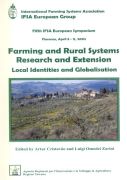
Farming and rural systems research and extension - Local identities and globalisation

The proceedings of the 4th European IFSA Symposium (held in Florence, Italy) were edited by Artur Cristovao and Luigi Omodei Zorini and published in 2003 by the Agenzia Regionale per lo Sviluppo e l'Innovazione nel settore Agricolo e forestale (ISBN 88-8295-043-3), 798 pp.
Table of Content
Workshop 1:Concepts and methodologies, chaired by Werner Doppler
Contributions and discussions focused on the composition, relations and the overall rational of problems, objectives, design, structure and strategies in a selected area of systems research and extension. Authors were asked to use methodologies dealing with the ways and means relevant to apply and implement quantitative/qualitative methods as well as the role of participation and modelling. Areas of special interests are: the linkage or integration of natural and social sciences (e.g. farm and family), the relations between micro and macro-economic as well as social development, the relations between resource owner and user, between farming and non-farming families and the society's interest, the rural and urban relations and relations between different social or ethnic groups.
Workshop 2:Resilience and continuity of small scale farming within sustainable rural livelihood systems, chaired by David Gibbon
This theme was built on the discussions and conclusions emerged on the same topic during the Volos meeting in 2000. In addition, it was examined the potential role for the sustainable livelihoods framework, now widely used in developing and developed country contexts in contributing to the continuity of small scale farming systems in Europe. Contributions from both theoretical analytical studies and case studies from widely differing contexts were accepted.
Workshop 3:Rural-urban relations, chaired by D. Goussios
The workshop represented the chance to consider the role of urban areas within rural territories in a context of globalisation and application of local and rural development policies. How can the small town regain the role of driving element in rural territories searching for new strategies of integrated development? Which are the contradictions, incompatibilities and complementarities between traditional agricultural policy and the newborn rural policy? The workshop allowed considering the new forms of household agriculture and rural enterprise (multi-activity, mobility and urbanisation) that will influence the new spatialities and dynamics of territories’ organisation and development.
Workshop 4:Quality of life, food, landscape, environment: From rural resources to better livelihood systems for people, chaired by Artur Cristovao
The multifunctional role of rural space, increasingly required by the population, includes sound land use, environmental-friendly farm practices, production of quality food and rural and eco-tourism initiatives. These are, among others, matters of attention of policy making, research and action. The objective of this workshop was to give answers to some of the following questions: Who are the main actors involved in these diversification processes? Who is taking advantage of the rural resources and getting most benefits out of them? What are the conditions and difficulties in promoting an integrated and sustainable use of rural resources? Is a broader view of rural resources leading to better livelihood systems for the rural people or mainly to better quality of life for some urban people?
Workshop 5:Learning processes in research and extension, chaired by Janice Jiggins
In continuity with previous meetings the workshop focused on: a. the complementarities and differences between “theories of learning” and “theories of action” as frames for conceptualising learning processes, and the implications of these for practice b. the role of the researcher in relation to facilitation of learning, in the confrontation of differing social conceptions of given issues, and to the organisation of social spaces in which (formal and informal) learning can occur c. learning approaches to the study and design of new standards and norms that promote and support the ecological and environmental functions of agriculture d. the study and improvement of new tools and methods for involving stakeholders (and “non-participants”) in learning processes and platforms, at a range of agro-ecosystem scales.
